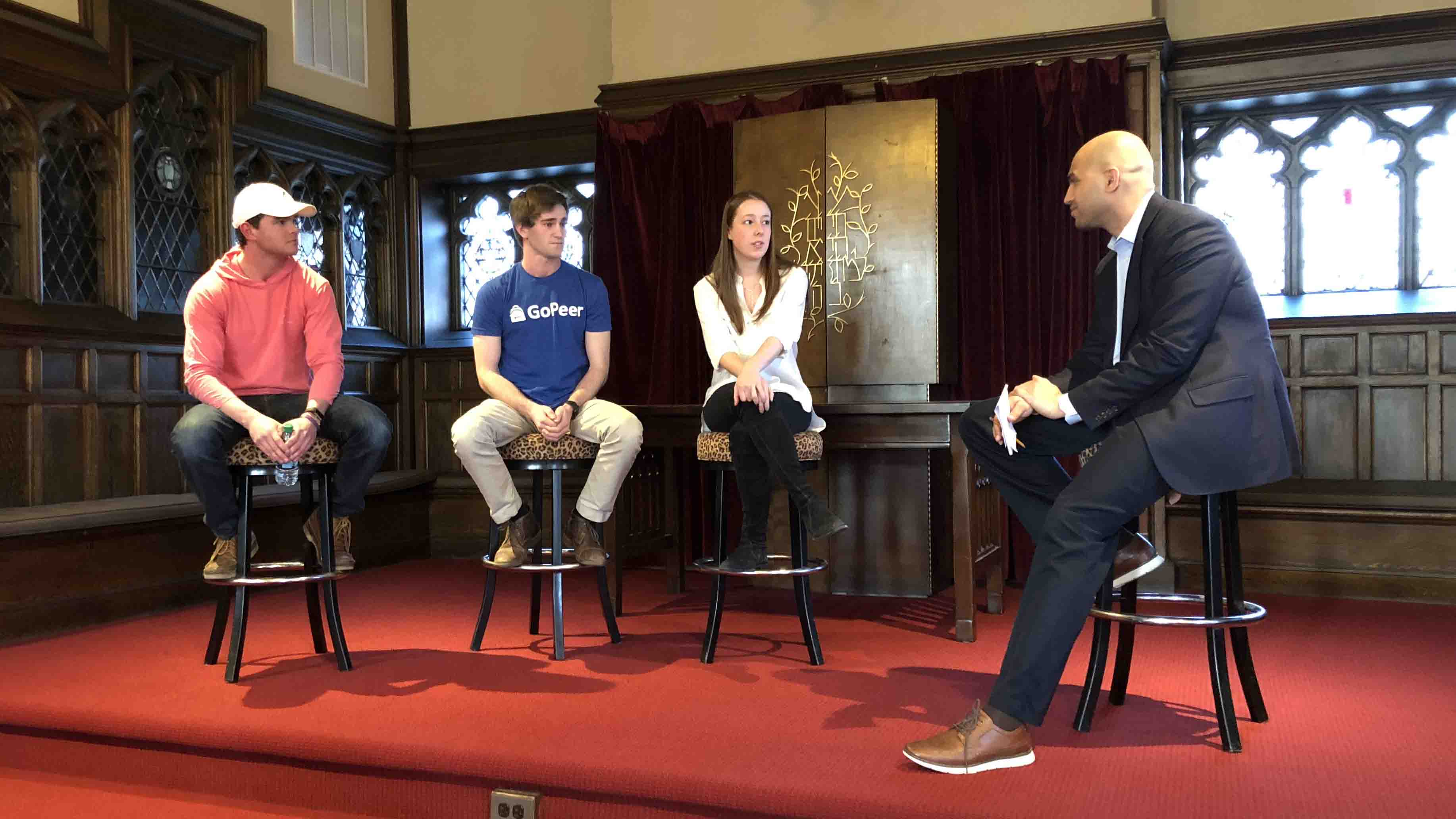Who’s the Boss?
By Stephen Wilson
Most students balance class schedules with social schedules, practice schedules with campus activities, career planning with community engagement. It’s a lot to juggle.
Try adding the title of CEO.
Three student entrepreneurs are doing just that: leading fledgling businesses. Gillian Presto ’18, Ethan Binder ’19, and Mike Fogarty ’18 sat down with IDEAL Center director Yusuf Dahl to share their insights with classmates in a panel discussion.
Presto is co-founder of @New_Fork_City, a social media-based food promotion company with nearly 900,000 Instagram followers. It has worked with national chains including Oreo, McDonalds, and CitiGroup.
Binder is co-founder and CEO of GoPeer, a mobile and web-based platform that connects K-12 students and families with college undergraduate tutors. Over 70 families have used the platform in its Rhode Island launch market.
Fogarty is co-founder and owner of Western Sky Apparel, a lifestyle brand that blends prep and surf into a cohesive line of clothes. Founded in a small New Jersey beach town, the business aims to spread the love of coastal life to everyone.

Here’s some of what they said:
How do you manage college life and running a business?
GP: I have two other partners, and we divide up the work, taking turns during the weekends to gather content and using the summer to really stock up on inventory.
EB: I think it’s important to balance school, a social life, and a venture. I have two other co-founders, and we are disciplined and are efficient with our time.
MF: My co-founder and I do lots in the summer and plan ahead. We have a calendar we keep that lists all that we have to do and then stick to it.
What is the reaction at industry events or with clients when they learn you are college students?
GP: We started our business in high school. Many people underestimated the power of our ability to influence and didn’t think we knew what we were doing. They are impressed now especially since our clients are often older and in full-time positions.
EB: I usually don’t tell them I’m in college especially as I handle their credit card numbers. We just get the job done and build trust. It does help that our business works with students—we understand college students and can relate to secondary school students.
MF: People are often shocked at first but then think it’s cool.
Given the passions, risks, and costs your businesses demand, what advice would you give your classmates?
GP: Use your Lafayette College resources. Ask questions and get advice. Others out there can help and did help as we faced unforeseen costs and trademarks. There is a pool of advisers and mentors.
EB: Leverage your campus resources. IDEAL has business planning events and other financial projection assistance. It’s helpful stuff. And don’t just make plans; turn them into actions.
MF: Don’t give up. You have to be persistent. There are days when I question what I am doing, but I am glad I did it.
What are your postgraduate plans?
GP: I’m looking for a job. We have yet to monetize our business, so we see it as part-time side work. But it does look good on my résumé and helps in interviews.
EB: We plan to go with it. Based on our projections we will be profitable in six to eight months. So we are going to give it a shot.
MF: I’m going to grad school for architecture, so this will be a side job.
How do you keep your competitive edge?
GP: We are the largest food account on Instagram and rely on user-generated submissions. It keeps our followers engaged and helps us create a relationship and conversation.
EB: Our marketplace is saturated. What makes us different is price. We charge far less than our competitors. So it’s a fair price for a quality educational boost. We only hire college students and have a five-step on-boarding approach to ensure strong tutors. And our client feedback is strong.
MF: We follow our metrics to see who is buying our products and pivot based on what we are seeing.
When did you know or realize you were legitimate?
GP: We entered the food marketplace early in social media. The high follower count alone helps bring in clients. Watching those numbers increase and landing those clients tells me we have something.
EB: A mom reached out to us. Her son needed help in order to pass a test and be accepted in a specific high school. We were the only tutoring program she could afford. It worked. He passed the test and got in. Seeing their experience really makes what we are doing have meaning.
MF: Our first weekend in business, we sold out all of our inventory. We were shocked. Now we are going to California for a spring fashion show.